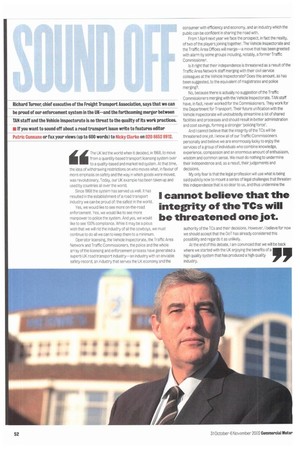66 from a quantity-based transport licensing system over The UK
Page 52

If you've noticed an error in this article please click here to report it so we can fix it.
led the world when it decided, in 1968, to move to a quality-based and market-led system. At that time, the idea of withdrawing restrictions on who moves what, in favour of more emphasis on safety and the way in which goods were moved. was revolutionary. Today, our UK example has been taken up anc used by countries al over the world.
Since 1968 the system has served us well. It has resulted in the establishment of a road transport industry we can be proud of the safest in the world. Yes, we would like to see more on-the-road enforcement. Yes, we would like to see more manpower to police the system. And yes, we would like to see 100% compliance. While it may be a pious wish that we will rid the industry of all the cowboys, we must continue to do all we can to keep them to a minimum.
Operator licensing, the Vehicle Inspectorate, the Traffic Area Network and Traffic Commissioners, the police and the whole array of the licensing and enforcement process have generated a superb UK road transport industry—an industry with an enviable safety record, an industry that serves the UK economy and the
consumer with efficiency and economy, and an industry which the public can be confident in sharing the road with. From lApril next year we face the prospect, in fact the reality, of two of the players joining together. The Vehicle Inspectorate and the Traffic Area Offices will merge—a move that has been greeted with alarm by some groups including, notably, a former Traffic Commissioner. Is it right that their independence is threatened as a result of the Traffic Area Network staff merging with their civil service colleagues at the Vehicle Inspectorate? Does this amount, as has been suggested, to the equivalent of magistrates and police merging?. No, because there is actually no suggestion of the Traffic Commissioners merging with the Vehicle Inspectorate. TAN staff have, in fact, never worked for the Commissioners, They work for the Department for Transport. Their future unification with the Vehicle Inspectorate will undoubtedly streamline a lot of shared facilities and processes and should result in better administration and cost savings, forming a stronger 'policing force'.
And I cannot believe that the integrity of the TCs will be threatened one jot. I know all of our Traffic Commissioners personally and believe we are enormously lucky to enjoy the services of a group of individuals who combine knowledge, experience, compassion and an enormous amount of enthusiasm, wisdom and common sense. We must do nothing to undermine their independence and, as a result, their judgements and decisions. My only fear is that the legal profession will use what is being said publicly now to mount a series of legal challenges that threaten this independence that is so dear to us, and thus undermine the
authority of the TCs and their decisions. However, I believe for now we should accept that the DoT has already considered this possibility and regards it as unlikely. At the end of this debate, I am convinced that we will be back where we started with the UK enjoying the benefits of a high quality system that has produced a high quality industry.




























































































































































